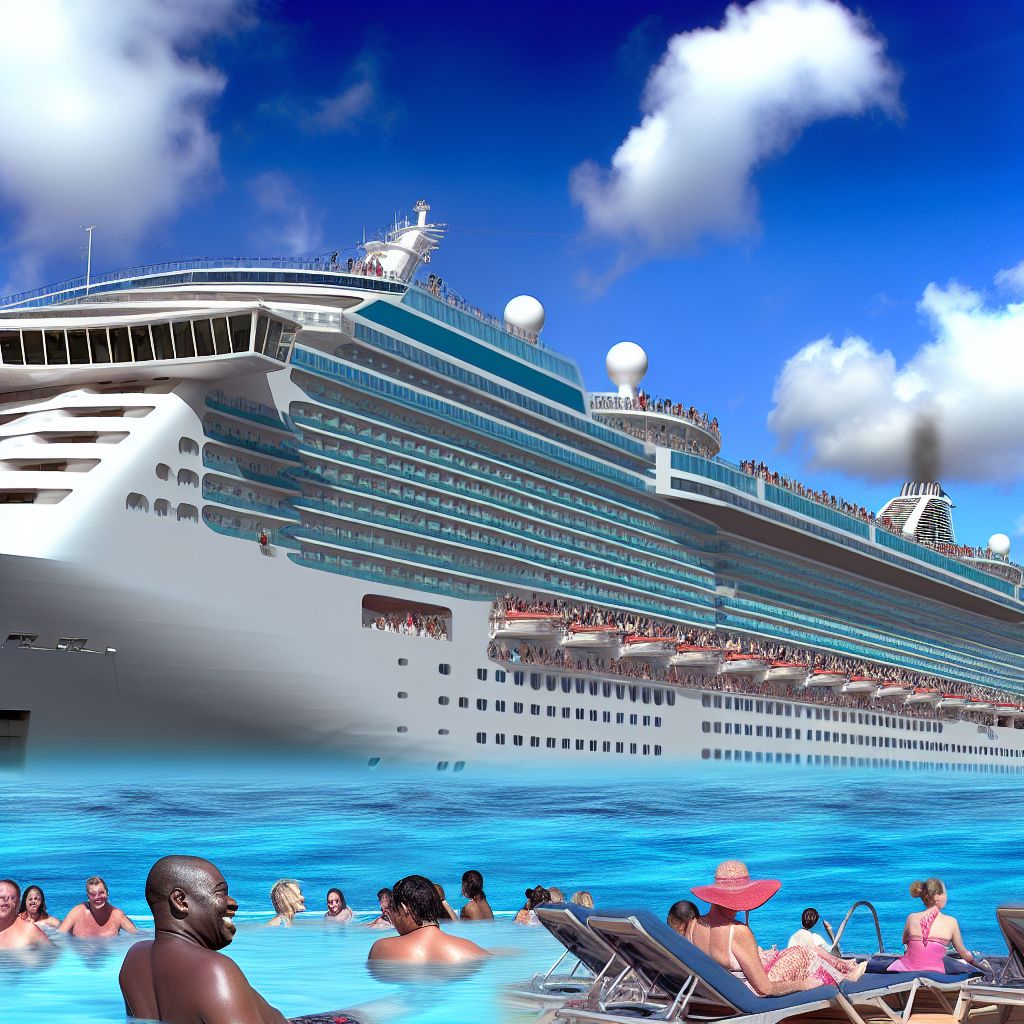Deutsch: Kreuzfahrtschiff / Español: Crucero / Português: Navio de cruzeiro / Français: Paquebot de croisière / Italiano: Nave da crociera
In the travel context, a cruiseliner refers to a large passenger ship designed for leisure voyages, where the journey itself and the ship's amenities are a part of the travel experience. Unlike traditional passenger ships that primarily transport people from one point to another, cruiseliners offer a variety of onboard activities, entertainment, dining options, and accommodations, making them floating resorts that cater to a wide range of interests and ages.
Description

Cruiseliners are known for their impressive size and the breadth of facilities they offer. These can include multiple dining venues, swimming pools, theaters, gyms, spas, shops, and sometimes even unique features like rock climbing walls, ice-skating rinks, or surf simulators. The design and amenities of a cruiseliner are focused on providing passengers with an enjoyable and comfortable experience during their sea journey.
Cruises offered by these ships can vary in length from short getaways of a few days to world cruises lasting several months, covering many destinations and continents. Itineraries are designed to appeal to different tastes, with some focusing on tropical paradises, others on cultural exploration in historic cities, and some even venturing into remote locations like the Arctic or Antarctic.
Application Areas
- Vacation Travel: Cruiseliners are a popular choice for families, couples, and solo travelers looking for an all-inclusive vacation experience.
- Leisure and Recreation: Providing an all-encompassing vacation experience with various leisure activities and entertainment.
- Cultural and Scenic Exploration: Offering itineraries that include stops at ports of call with cultural, historical, or natural significance.
- Event Hosting: Accommodating events such as weddings, conferences, and family reunions with unique settings and facilities.
- Educational Programs: Some cruises offer educational programs and lectures on topics related to the ship's itinerary, including history, culture, and natural science.
Well-Known Examples
- Royal Caribbean International: Known for its innovative ships that include features like rock climbing walls, surf simulators, and robotic bartenders.
- Carnival Cruise Line: Popular for its fun, family-friendly atmosphere and wide range of onboard activities and entertainment.
- Cunard Line: Offers a more traditional cruising experience with an emphasis on luxury, including the iconic Queen Mary 2, known for transatlantic voyages.
Treatment and Risks
While cruising offers a memorable and enjoyable travel experience, there are considerations related to environmental impact, such as the carbon footprint of marine travel and the effect of large numbers of tourists on local destinations. The industry is addressing these concerns through the development of more fuel-efficient ships and sustainable practices.
Additionally, health and safety have become paramount, especially in light of recent global health events, leading to enhanced health protocols and safety measures onboard.
Similar Terms
- Ocean Liner: Historically used for point-to-point passenger transport across oceans, distinct from cruiseliners that are designed for leisure voyages.
- Mega Ship: Refers to the largest class of cruiseliners, capable of accommodating thousands of passengers and offering an extensive range of amenities and activities.
Summary
Cruiseliners in the travel context represent a unique and comprehensive approach to vacationing, combining the ease of all-inclusive resorts with the adventure of exploring multiple destinations. These floating resorts cater to a wide audience by offering a variety of onboard activities, entertainment, and dining options, alongside opportunities to visit and learn about different cultures and landscapes. As the industry evolves, cruiseliners continue to adapt, focusing on Sustainability and safety to ensure that they remain a favored choice among travelers seeking a diverse and enriching travel experience.
--
Related Articles to the term 'Cruiseliner' | |
| 'Eurostar' | ■■■■■■■■■■ |
| Eurostar in the travel context refers to a high-speed train service that connects several major cities . . . Read More | |
| 'Traffic' | ■■■■■■■■■■ |
| In the travel context, "traffic" refers to the movement of vehicles and pedestrians on roads, streets, . . . Read More | |
| 'Two-door' | ■■■■■■■■■■ |
| Two-door: In the travel context, "two-door" typically refers to a type of vehicle configuration, most . . . Read More | |
| 'Windshield' | ■■■■■■■■■■ |
| Windshield: In the travel context, a windshield is a critical component of a vehicle, designed to protect . . . Read More | |
| 'Washington' | ■■■■■■■■■ |
| In the travel context, "Washington" refers to several destinations that are popular among travelers and . . . Read More | |
| 'Inclusive' | ■■■■■■■■■ |
| In the travel context, "inclusive" refers to a type of travel package or experience that includes a comprehensive . . . Read More | |
| 'Retail' | ■■■■■■■■■ |
| In the travel context, 'retail' refers to the sale of goods and services to travelers or tourists, typically . . . Read More | |
| 'Reimbursement' | ■■■■■■■■■ |
| Reimbursement in the travel context refers to the process of compensating travelers for expenses incurred . . . Read More | |
| 'Steward' | ■■■■■■■■■ |
| Steward: A steward in the travel context primarily refers to a flight attendant, a professional responsible . . . Read More | |
| 'Haifa' | ■■■■■■■■■ |
| Haifa in the travel context refers to a major port city in Israel, located on the northern slopes of . . . Read More | |
